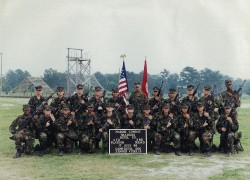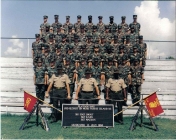Specialty Summary. Performs and manages air transportation activities. Plans, schedules and processes eligible passengers and cargo for air movement. Loads and unloads passengers, cargo, and baggage moved on military and commercial-contract aircraft. Prepares and maintains air movement records and reports. Performs aircraft cleaning services and delivers meals and comfort item supplies to aircraft. Operates forklifts and aircraft loading equipment. Uses computer systems to provide in-transit visibility over passenger and cargo movement operations.
Duties and Responsibilities:
Plans, organizes, directs, coordinates, and controls air transportation activities. Determines and justifies personnel, equipment, and facilities required to accomplish air transportation functions. Supplements policies, directs personnel, and establishes procedures to process, load, document, and report passengers and cargo transported by air, including paratroops and cargo moved using aerial delivery methods. Develops procedures for handling special category passengers. Enforces safety and security measures.
Determines and implements necessary safety and security precautions for handling and storing dangerous materials, special cargoes, mail, and baggage. Plans and manages fleet service activities to provide cleaning, lavatory servicing, and meal delivery on aircraft. Supervises forklift and aircraft loading equipment use for passenger and cargo loading and unloading operations. Inspects airlift activities for compliance and recommends corrective action. Conducts personnel and equipment management surveys, and provides technical assistance as required.
Provides the Department of Defense a capability to move air passengers worldwide. Offers customers information on flight schedules, routes, air movement requirements, baggage limitations, and specifics on local facilities. Performs procedures to check in, process, schedule, transport, and escort passengers to and from aircraft. Ensures all passenger border clearance requirements have been met. Operates terminal security equipment and conducts passenger and baggage security inspections. Reviews passenger travel authorizations for validity and accuracy. Applies common user and international tariff rates, collects fares, and accounts for documents and monies. Uses computer systems to provide in-transit visibility and to document passenger movement operations.
Provides the Department of Defense a capability to move air cargo worldwide. Verifies eligibility of cargo offered for airlift. Ensures all cargo documentation, packaging, labeling and marking requirements, and border clearance requirements have been met. Determines quantity and type of cargo to be loaded according to allowable aircraft cabin load. Selects, assembles, palletizes, and transports cargo loads to and from aircraft and storage areas. Checks cargo against manifests and annotates shipment overages, shortages, or damages. Secures cargo with appropriate restraint equipment. Exercises necessary safety and security precautions in handling and storing hazardous or special cargoes and mail. Packs cargo parachutes, rigs airdrop platforms, and loads aircraft performing aerial delivery tactics. Uses computer systems to provide in-transit visibility and to document cargo movement operations.
Performs command and control and fleet service functions. Prepares, completes, and maintains air movements records, documents, and reports. Prepares and maintains travel forms and weight and balance records. Preplans and computes aircraft load distribution. Ensures aircraft cleanliness and maintains records on fleet service equipment, supplies, and activities. Completes actions to requisition, store, and issue expendable and nonexpendable items for use on aircraft. Delivers supplies and meals to aircraft.
Specialty Qualifications:
Knowledge. Mandatory knowledge comprises a thorough understanding of passenger and cargo movement functions to include transport aircraft types, capabilities, and configuration; weight and balance factors; airlift transportation directives and documentation; cargo restraint techniques; border clearance requirements; operation of materials handling and other types of loading equipment or devices, fleet service functions; automated data processing equipment and its application in airlift activities; passenger service functions, and customer relations principles; and aerial delivery techniques and equipment use.
Education. For entry into this specialty, completion of high school or a general educational development equivalency is desirable.
Training. The following training is mandatory for award of the AFSC indicated:
2T231. Completion of a basic air transportation course.
2T271. Completion of the advanced air transportation course.
Experience. The following experience is mandatory for award of the AFSC indicated:
2T251. Qualification in and possession of AFSC 2T231. Also, experience in functions such as processing cargo and loading and unloading aircraft; operating automated or manual materials handling and other loading equipment; processing and loading and unloading passengers; performing aircraft fleet service functions; rigging aerial delivery cargo; or processing, scheduling, and maintaining records relating to passenger and cargo movement.
2T271. Qualification in and possession of AFSC 2T251. Also, experience supervising functions such as preparing aircraft load plans; processing cargo and loading and unloading aircraft; operating automated or manual materials handling and other loading equipment; processing and loading and unloading passengers; performing aircraft fleet service functions; rigging aerial delivery cargo; or processing, scheduling, and maintaining records on passenger and cargo movement.
2T291. Qualification in and possession of AFSC 2T271. Also, experience managing passenger and cargo, movement activities.
Other. The following are mandatory as indicated: For entry, award, and retention of AFSCs 2T211/31/51, qualification to operate government vehicles according to AFI 24-301, Vehicle Operations. For award and retention of AFSCs 2T251/71/91/00 must maintain an Air Force Network License according to AFI 33‑115, Vol 2, Licensing Network Users and Certifying Network Professionals.




